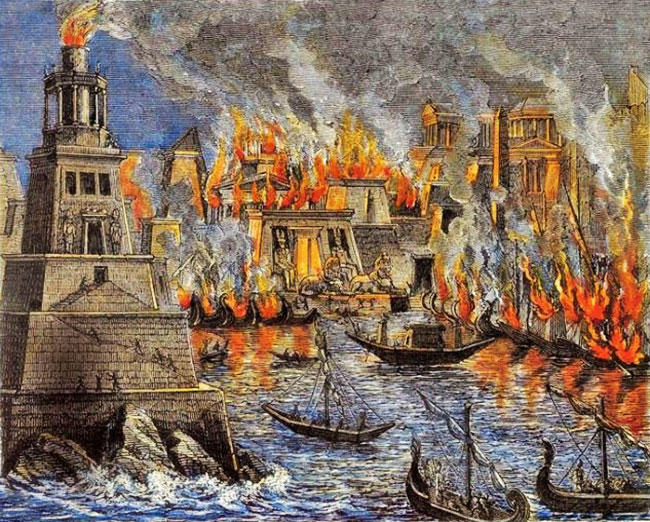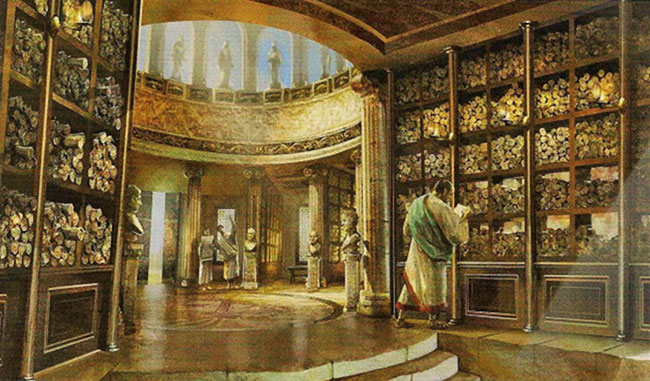|

by Janice Friedman
August 23,
2019
from
Ancient-Code website
Spanish
version

When Alexander the Great set about conquering the known
world, he created cities in the wake of his conquests.
The most well known of
these is Alexandria, although he did find something around 17
different cities bearing the name.
There's one specific Alexandria
that's stood out among its peers, located in Egypt.
This Alexandria was
host to the
Library of Alexandria, a veritable encyclopedia of
the entirety of the world's knowledge at that time.
And then it was burnt.
While the Library of
Alexandria survived several destructive forces throughout its
existence, the most destructive was due to Julius Caesar.
As an accidental
casualty of war, the Library suffered extensive damage during the
Ptolemaic siege in 48 BCE.
The library
continued to operate afterward, and while the extent to which it was
destroyed is uncertain, there were undoubtedly countless
irreplaceable texts lost.
The nature of the
Library of Alexandria was meant to compile all of the world's
knowledge. With every new ship that came into port, their books
onboard were confiscated, copied, and then the copies returned to
their original owners.
Doing so created
the world's greatest resource of knowledge and learning.
This May Have Included
Knowledge About Aliens
We have been
establishing historical documentation for years.
Flying saucers in
the sky, blinking lights, and other strange phenomena have been well
documented for centuries.
If we've been experiencing inexplicable
phenomena in our modern day and age, then there's a chance that the
Library of Alexandria contained the truth about aliens.
This truth, of
course, can come in a variety of forms.
There's the
long-standing belief that the Ancient Egyptians received
otherworldly guidance when establishing their civilization.
While we
have no concrete surviving evidence of that, the Library of
Alexandria may have housed that knowledge.
There's more than a
direct intervention that could theoretically inform us about the
existence of aliens.
Eyewitness accounts, records, encounters, all
of which could have been stored in the library for future
generations to learn from.
However, the
possibility of this knowledge now surviving is unlikely, due to the
library's burning.
There are Accounts Still
Living
Alexandria, while
holding the greatest store of the world's knowledge, did not hold
all its copies.
There were too many
civilizations at the time to fail to store our history.
Whether or not
Alexandria lost a significant portion of what we could perceive as a
historical record of
alien contact, we still have other sources to
pull from.
1. Plutarch
Plutarch was a
Greek historian and biographer who lived between 46 and 120 AD.
He later became
a Roman citizen, adopting the name Lucius Metrius Plutarchus.
While his duties in his life varied, his most notable works
involved the detailing of various Roman Emperors.
These Roman
figures lived long before his time, but his works are regarded
by historians as reliable historical sources.
Most of
Plutarch's works have been lost to time. Those that have
survived to this day are in the majority only fragments of his
work, and only a few are complete.
However,
there's important information to be derived from the work that
we do still have from him.
One of the
biographies Plutarch worked on was centered around a man named
Lucullus.
He was a politician who served both in the
government and in the military.
What's
important here is not the man himself, but rather an event that
occurred that Plutarch recorded in the biography.
The story goes
that Lucullus was leading an army against
Mithridates,
the king of Pontus. This had been a long ongoing conflict
between the Romans and Mithridates, with Lucullus facing him in
the Third Mithridatic War.
The event in
question took place before a battle with Mithridates, before the
conflict began.
The account of
the extraterrestrial strikes many similar beat to modern
recounts.
As Lucullus marched to battle, the sky evidently
opened up to welcome the coming object.
It was
described as,
"[appearing]
a rapidly descending object resembling a flame, which
appeared like a vase in shape and like a glowing annealed
metal in color."
This
description is taken directly from Plutarch's biography of
Lucullus.
It needs to be
noted that Plutarch lived long after any of these Romans lived.
However, he also lived long after the initial burning of the
Library of Alexandria.
Plutarch was
renowned for his research, including quotations and sources in
each of the Lives he wrote.
Essentially,
since he learned of this alien event that Lucullus experienced,
it's probable that other documentation of similar events lived
as well.
2. Alexander the
Great
There's no
better source than the man who founded Alexandria himself.
Alexander the Great is regarded as one of humanity's
greatest military leaders. According to historical records,
Alexander was recorded to have experienced similar phenomena
that could easily be described as extraterrestrial.
The modern take
on the tale has been established by
Frank Edwards, written in
1959.
According to
the story,
while Alexander the Great was leading a siege on Tyre, he received assistance by "great silver shields" in the sky.
The
extent of the UFO's description ends there, beyond there being
three of them flying in a triangle formation.
The UFO's then,
allegedly, fired a beam into Tyre's walls, destroying them and
allowing Alexander's army entrance into the city.
These shields
have reappeared in other campaigns that Alexander lead as well.
While in combat against the Indian army, these same shields were
reported to have appeared above the river they were fighting
over.
Their swooping
down startled the steeds of both armies, and after Alexander the
Great won the battle he decided against pressing on into Indian
territory.
However, there
are issues to be taken into account with this account of an
extraterrestrial presence.
While the myth of aliens assisting
Alexander in his conquest has gained popularity, the extent of
its validity goes no further than Edwards.
He did not cite
any sources when writing about the experience, and the histories
chronicling Alexander's exploits have been lost.
While there's a
chance that there are histories detailing alien presences in
Alexander the Great's campaigns, as of now there are no
reputable sources to reliably agree on these events occurring.
If Frank
Edwards secretly had documents detailing these stories, they
were never released.
Whether or not
the truth behind aliens aiding Alexander the Great would likely
have been found in the Library of Alexandria.
3. Titus Livius
Patavinus
Titus Livius
Patavinus, colloquially known as
Livy, is another well known
Roman historian.
While he also
lived post-Alexandria burning, any Roman documents are regarded
as historically significant due to their extensive practices for
reliable documentation.
Livy himself is
well-regarded, earning him more than a grain of salt when it
comes to his historical recounting. Livy's books of
History, of which he wrote many, accounted for much of the
established Roman history recorded.
However, the passage we're
interested in regards an account of "phantom
ships" in the sky. While the
record itself appears to be vague, the meteorological event
itself is significant.
Could this have been an accounting of
visiting extraterrestrials?
There's no
certainty, and experts in
UFO research contemplate that this experience was more
figurative than literal. However, the description itself seems
oddly geared toward a specific physical description, not unlike
what we've heard in our modern day.
It's even
within the realms of similarity with Plutarch's own description.
Regardless, the
excerpt describes an event taking place in 218 B.C., well within
the time frame of Alexandria's existence.
Surviving
accounts, kept by successors to historical knowledge, maintain
unexplained phenomena linked to what may be extraterrestrial
intervention prior to Alexandria's burning.
There's no
telling what other bodies of work written with the same intent
may have been lost in the fire.

The Jury's Still Out
For now, all we
definitely have to go on are historical accounts of bizarre events.
While Alexandria
hoarded an enormous amount of knowledge, much of which was lost, it
was not alone in stockpiling ancient accounts. There may have very
well been more detailed histories involving the ultimate truth of
alien presence on Earth.
These reports may
have not survived the fire of Alexandria, but bits and pieces of
that information continued to live on to be remade in the words of
later historians.
Whether those
accounts they present are evident of a greater truth is impossible
to tell.
The most we can do
is speculate and investigate...
| 


